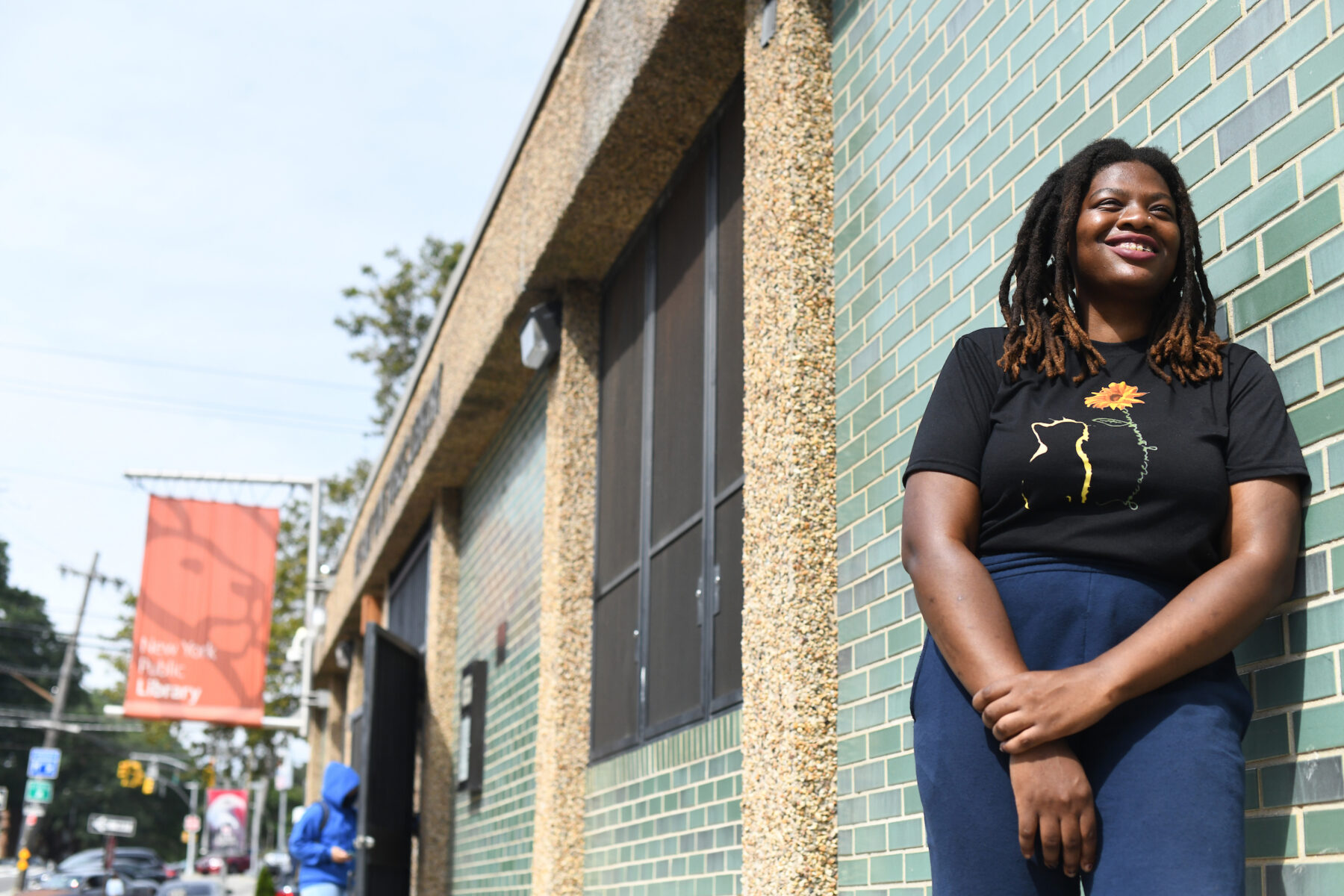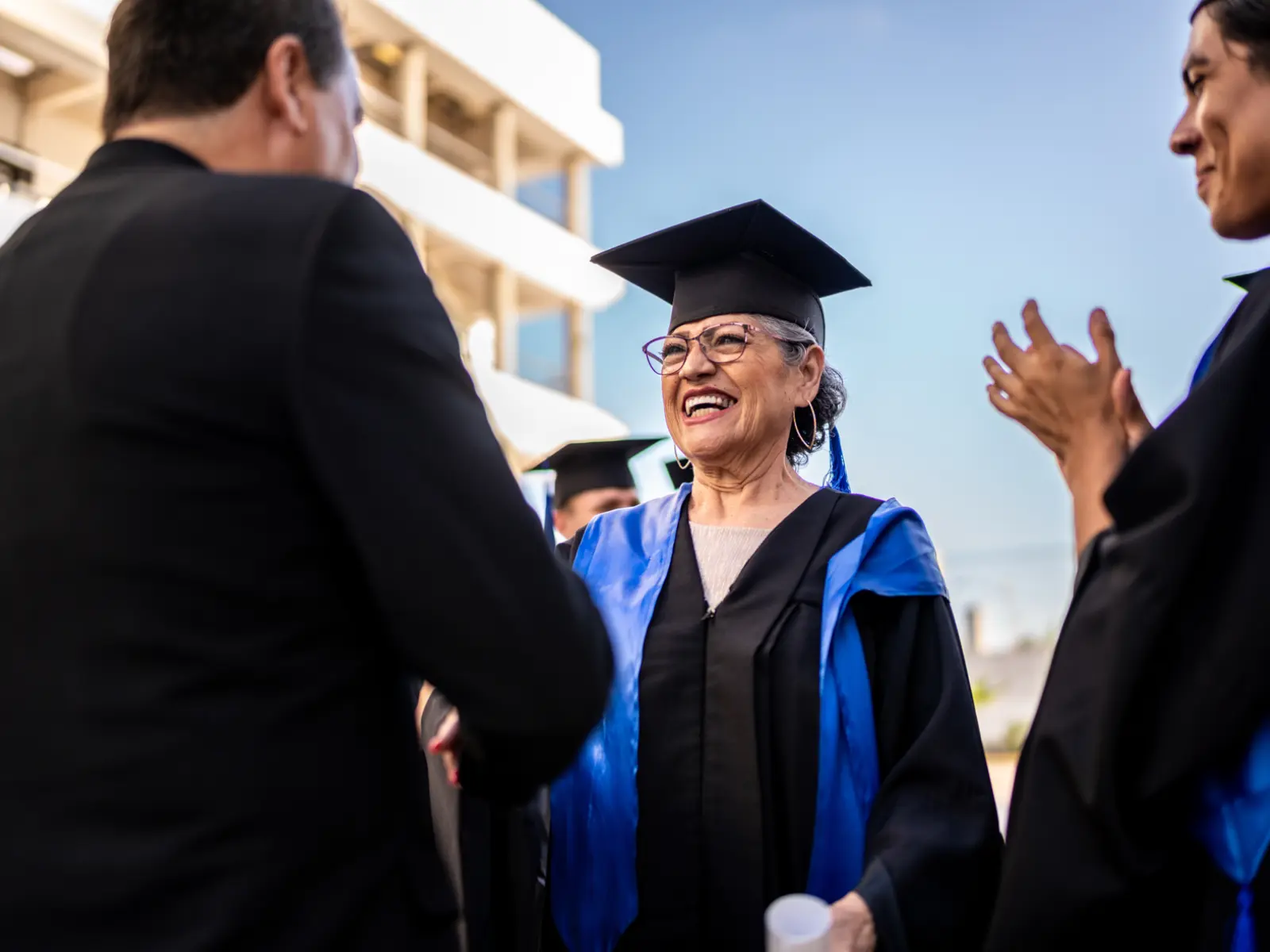Hope Obi dreams of a world in which everyone feels included. The budding film and music producer recently earned a bachelor’s degree in film and television studies from Lehman College, part of the City University of New York system, in the Bronx.
“I want to create films and documentaries and music videos that express how differently people live and how we can learn from each other,” she said. “Instead of speeding up the process, I wanted to be a part of the process of understanding how people live — people who don’t look like us or sound like us.”
Obi, 25, was born in Lagos, Nigeria. Her family immigrated to the U.S. when she was 3 years old. “Everyone wants to have a better opportunity,” she said. “My parents saw a better opportunity in the States.”
The family moved to the Bronx, where Obi and her five siblings grew up.
“Growing up in the Bronx was not a battleground,” Obi said, “but it was not a paradise.” All eight family members lived in an apartment; she never had her own room. “I wasn’t the kind of child that begs to have their own room,” she said. “I knew my parents were working hard to provide for six children and themselves.” Her mother worked as a nurse and her father drove for a taxi service.
“I didn’t have my own bedroom, but I had my own songs, my own voice,” said Obi, who loves writing music and singing. “That’s something I did not have to ask for permission to have.”
Obi’s successful journey to a college degree isn’t the norm. Nearly one in 7 adults between the ages of 25 and 64 have taken some college courses but not completed a degree, and Black adults are the most likely demographic to have some college education but no degree, according to The Institute for College Access and Success.
Overall, roughly 63% of students who began seeking a bachelor’s degree at a four-year institution in 2013 completed that degree at the same institution within six years, according to the National Center for Education Statistics.
Amount of students who began seeking a bachelor’s degree at a four-year institution in 2013 and completed that degree at the institution within six years
“The reality is, if four-year institutions were high schools, according to federal law, then they would be considered dropout factories,” said Kelly McManus, director of higher education with Arnold Ventures. “What higher education federal policy has always focused on is increasing access — Pell Grants, student loans, and other programs are designed to get students in the door. What we don’t have yet is a culture of completion.”
Through the American Families Plan, the Biden administration has proposed a $290 billion in higher education spending to provide tuition-free community college, support for historically Black colleges, increased Pell Grant awards, among other targeted initiatives.
Included in the proposals is a $62 billion College Completion Fund, which would signal a shift in federal higher education policy focused not just on college admission, but on programs that have proven completion rates.
‘Really Promising and Very Rare’
Obi benefitted from two such programs that could see unprecedented expansion if the fund proposal becomes law.
In 2016, she enrolled at Borough of Manhattan Community College, where she learned about the Accelerated Study in Associate Program, or ASAP.
ASAP is a CUNY-developed program designed to help students seeking an associate’s degree graduate. Despite the strengths that students bring to their college experience, systemic barriers and personal responsibilities prevent many from graduating on time or at all.
A randomized controlled trial (RCT) of ASAP found that the program led to an 18 percentage point increase in college graduation rates at the three-year follow-up: 40% of students in treatment group earned a degree compared to 22% of the control group.
According to Erin Crossett, evidence-based policy manager at Arnold Ventures, at the three-year study mark, the ASAP program nearly doubled the rate of college-degree completion, relative to the control group. “This is really promising and very rare in all areas of social policy,” Crossett said. “This is a unique opportunity. We’re very confident that ASAP works and replicates across different geographic contexts … and we have not definitive but interim evidence that suggests that these effects are replicating in a four-year context.”
The ASAP three-year graduation rate is over three times higher than the national urban community college three-year graduation rate of 16%.
The reality is, if four-year institutions were high schools, according to federal law, then they would be considered dropout factories.Kelly McManus director of higher education with Arnold Ventures
In two years, Obi had earned her associate’s degree in early childhood education. “I had already graduated, and I wanted to go to the next step, but I wasn’t financially ready,” she said.
Still, she never doubted her success. Obi’s mother, even with the demands of raising children and working, earned her master’s degree. “My mom is a person who doesn’t give up, so I think I got that from her,” Obi said. “I’m very determined.”
In 2019, she enrolled at Lehman College to pursue her dream of working in the entertainment business. Since she had been a part of the ASAP program already, she learned about the Accelerate, Complete, and Engage (ACE) program through an email from the school and applied. An adaptation of the ASAP model, ACE is implemented in four-year, rather than two-year, colleges, with the aim of improving on-time graduation with a Bachelor’s degree.
With little career guidance or inspiration outside of becoming a teacher or police officer, Obi said she was drawn to entertainment and media. “I learned what I wanted for my career by watching TV, using social media, and learning from how people interact with each other.”
“The main ingredients of ASAP are all there,” said Crossett. “ACE requires full-time enrollment, provides tuition support, provides financial incentives, mentorship and advising, and it helps students determine what they want their degree to be so they are on a pathway to completing the necessary coursework on schedule.”
But for Obi, the program provided other guidance, too.
“The ACE program helped me get into other programs like MediaMKRS, which helped me get ready for the industry — to help with work readiness and what to expect,” she said. MediaMKRS, which is a partnership in part with the NYC Mayor’s Office of Media and Entertainment, media companies, and unions, helped set her up with her two media-focused internships with New York International Children’s Film Festival and Maven Screen Media.

“The relationship that ACE advisors build with their students is the mechanism that allows for a very intentional and customized provision of academic and financial supports and resources,” said Christine Brongniart, university executive director for CUNY ASAP|ACE.
ACE also helped boost Obi’s confidence. “[The program] helped me to be able to express how I feel inside,” she said. “Many people don’t like talking about themselves, but … why be afraid to express who I am — my flaws and what I’m learning to be capable of doing?”
She also forged connections and built relationships with the ACE participants in her program, friends that, she said, provide a sounding board and supportive base.
Brongniart said that outcome is intentional. “Students have busy and complex lives, and ACE’s supports, and in particular the program’s approach to personalized advisement, maintains an authentic investment in each ACE student’s success,” she said.
‘Integrated and Intentional’
The majority of college students today are not directly out of high school. They are older adults, returning students, and carry other responsibilities, like full-time work, raising children, or serving as caretakers for aging parents.
“ACE makes a four-year institution a better bet for students, particularly students who have been traditionally underserved by our higher education system,” said McManus.
And unlike university career centers that few students take advantage of, among other unused resources, McManus said, “The beauty of ACE is that it’s integrated and intentional.”
“If higher education is going to continue to be the best pathway to the middle class, and the best pathway to economic mobility and stability, then we have to make sure that we are setting people up for success and meeting them where they are,” McManus said. “We invest so much money as a country in higher education every year, but we expect almost nothing from institutions for it — and we don’t equip institutions to help students graduate.”
An ongoing RCT of ACE is showing very promising interim results. According to Crossett, “The two-year impacts are very large and significant, and actually have increased in magnitude relative to what they were in the first year … with a 17 percentage point increase in the number of students who are on track for four-year graduation.” Though the final, four-year degree completion results are needed to confirm ACE’s success, these interim results provide confidence that the earlier ASAP impacts are replicating in a four-year context.
One of the largest factors holding institutions back from ASAP is implementation and high start-up costs.
According to McManus, Biden’s proposed dedicated funding would provide a federal source to meet that need and remove that financial barrier.
“That investment has the potential to transform higher education,” said McManus. “This will be, by far, the biggest investment in evidence-based practices, and would help programs like ACE no longer be tiny, bespoke programs at a handful of institutions, but really enable scaling up and replication.”
As for Obi, she’s proud to add another degree to her list of accomplishments. “I feel good,” she said. “I feel like I’m able to pursue what I really wanted to do.”













